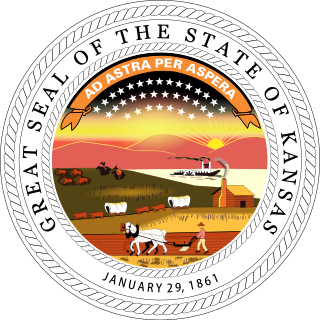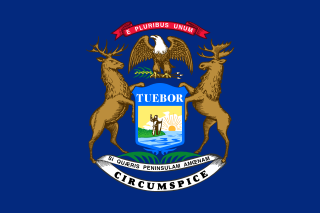State
Governor and Lieutenant Governor
Republican candidate Rick Snyder beat Democratic Party candidates Virg Bernero 58% to 40% to become Governor. Brian Calley was Snyder's running mate and was elected Lieutenant Governor.

The Republican Party, also referred to as the GOP, is one of the two major political parties in the United States; the other is its historic rival, the Democratic Party.

Richard Dale Snyder is an American politician, business executive, venture capitalist, lawyer and accountant who served as the 48th governor of Michigan from 2011 to 2019. He is a member of the Republican Party.

The Democratic Party is one of the two major contemporary political parties in the United States, along with the Republican Party. Tracing its heritage back to Thomas Jefferson and James Madison's Democratic-Republican Party, the modern-day Democratic Party was founded around 1828 by supporters of Andrew Jackson, making it the world's oldest active political party.
Secretary of State
Republican candidate Ruth Johnson won the election with 50.7%, Democratic Party candidate Jocelyn Benson got 45.2%, Libertarian Party candidate Scotty Boman got 1.8%, U.S. Taxpayers Party candidate Robert Gale got 1.3% and Green Party candidate John A. La Pietra got 1.0%.
Ruth Johnson is the former Secretary of State of Michigan and current member for State Senate District 14. She is a former member of the Michigan House of Representatives and the 2006 Republican candidate for lieutenant governor as the running mate of Dick DeVos.

Jocelyn Benson is the Secretary of State of Michigan. She is also the former Dean of Wayne State University Law School in Detroit, Michigan, a co-founder of the Military Spouses of Michigan and a board member of the Ross Initiative in Sports for Equality. She is the author of "State Secretaries of State: Guardians of the Democratic Process." Crain's named her one of Michigan's "Most Influential Women" in 2016 and in October 2015 she became one of the youngest women in the state's history to be inducted into the Michigan Women's Hall of Fame, second only to Serena Williams. On November 6, 2018, Benson was elected to be Michigan's next Secretary of State, becoming the first Democrat to hold the office since Richard H. Austin left office in 1995.

The Libertarian Party (LP) is a political party in the United States that promotes civil liberties, non-interventionism, laissez-faire capitalism and shrinking the size and scope of government. The party was conceived at meetings in the home of David F. Nolan in Westminster, Colorado in 1971 and was officially formed on December 11, 1971 in Colorado Springs, Colorado. The founding of the party was prompted in part due to concerns about the Nixon administration, the Vietnam War, conscription and the end of the gold standard.
Attorney General
Republican candidate Bill Schuette won the election with 52% of the votes, while Democrat David Leyton got 43.5%. Libertarian Party candidate Daniel W. Grow got 2%, and U.S. Taxpayers Party candidate Gerald Van Sickle got 1.9%.

William Duncan Schuette is an American lawyer and politician who served as the 53rd Attorney General of Michigan from January 1st, 2011 to January 1st, 2019 He was the unsuccessful Republican nominee for Governor of Michigan in the 2018 gubernatorial election, losing to Democrat Gretchen Whitmer.
State Senate
Prior to the November 2010 election, in the Michigan Senate the Democratic Party had 16 seats and the Republican Party had 22. After the election, the Republican Party gained 4 seats, giving them 26 seats over the Democratic Party's 12.

The Michigan Senate is the upper house of the Legislature of the U.S. State of Michigan. Along with the House of Representatives, it composes the Michigan Legislature. Article IV of the Michigan Constitution, adopted in 1963, defines the role of the Legislature and how it is to be constituted. The primary purpose of the Legislature is to enact new laws and amend or repeal existing laws.
State House of Representatives
Prior to the November 2010 election, the Democratic Party held 65 seats in the House and the Republican Party held 42 seats. The Democratic Party lost 18 total seats, and after this election had 47, while the Republican Party's victory brought them up to 63 seats in the House, swaying the Michigan House of Representatives' majority from the Democratic Party to the Republican Party.

The 1978 United States Senate elections in the middle of Democratic President Jimmy Carter's term. Thirteen seats changed hands between parties. The Democrats at first lost a net of two seats to the Republicans, and then one more in a special election. Democrats nevertheless retained a 58-41 majority.

The 2008 United States Senate elections were held November 4, 2008, with 35 of the 100 seats in the Senate being contested. Thirty-three seats were up for regular elections; the winners were eligible to serve six-year terms from January 3, 2009 to January 3, 2015, as members of Class 2. There were also two special elections, the winners of those seats would finish the terms that ended January 3, 2013.

The 2008 congressional elections in Michigan were held on November 4, 2008 to determine who would represent the state of Michigan in the United States House of Representatives. Michigan had fifteen seats in the House, apportioned according to the 2000 United States Census. Representatives are elected for two-year terms; those elected will serve in the 111th Congress from January 4, 2009 until January 3, 2011. The election coincided with the 2008 U.S. presidential election.

The 2008 congressional elections in Missouri were held on November 4, 2008 to determine who will represent the state of Missouri in the United States House of Representatives. The primary election for candidates seeking the nomination of the Republican Party, the Democratic Party, and the Libertarian Party was held on August 5.

The Michigan gubernatorial election of 2010 was held on November 2, 2010. Incumbent Democratic Governor Jennifer Granholm was prohibited by the state's Constitution from seeking a third term. This resulted in a large pool of candidates which was whittled down, when the May 11 filing deadline passed, to two Democrats and five Republicans. Both the Cook Political Report and the non-partisan Rothenberg Political Report rated the election as leaning Republican.

The 2008 congressional elections in Kansas were held on November 4, 2008 to determine who would represent the state of Kansas in the United States House of Representatives, coinciding with the presidential and senatorial elections. Representatives are elected for two-year terms; those elected will serve in the 111th Congress from January 3, 2009 until January 3, 2011.

West Virginia's 2012 general elections were held on November 6, 2012. Primary elections were held on May 8, 2012.

The 2010 congressional elections in Arizona was held on November 2, 2010, to determine who will represent the state of Arizona in the United States House of Representatives. Arizona has eight seats in the House, apportioned according to the 2000 United States Census. Representatives are elected for two-year terms; those elected will serve in the 112th Congress from January 3, 2011 until January 3, 2013.

The 2010 US congressional elections in Texas were held on November 2, 2010 to determine who will represent the state of Texas in the United States House of Representatives. Representatives are elected for two-year terms; those elected served in the 112th Congress from January 2011 until January 2013.

The 2010 House elections in Iowa occurred on November 2, 2010 and elected the members of the State of Iowa's delegation to the United States House of Representatives. Representatives are elected for two-year terms; those elected served in the 112th Congress from January 3, 2011 until January 3, 2013. Iowa has five seats in the House, apportioned according to the 2000 United States Census.
Elections were held in Texas on Tuesday, November 2, 2010. Primary elections were held on March 2, 2010.

The Wisconsin spring nonpartisan primary election was held February 16, 2010. The Wisconsin spring nonpartisan general election was held April 6, 2010. Voters statewide cast ballots for Wisconsin Court of Appeals and Wisconsin Circuit Court judges.

The 2012 United States House of Representatives elections in Arkansas occurred on Tuesday, November 6, 2012 to elect the four U.S. Representatives from the state, one from each of the state's four congressional districts. The elections coincided with the elections of other federal and state offices, including a quadrennial presidential election.

The 2012 United States House of Representatives elections in Michigan was held on Tuesday, November 6, 2012, to elect the 14 U.S. Representatives from the state of Michigan, a decrease of one following the 2010 United States Census. The elections coincided with the elections of other federal and state offices, including a quadrennial presidential election and an election to the U.S. Senate. Primary elections were held on August 7, 2012. The filing deadling for candidates to file to run in the primary was May 15. Except for two seats, all the incumbents sought re-election. The open seats were the 5th and 11th Congressional Districts. Due to the loss of one seat from the 2010 Census, two congressmen ran against each other. Despite Democrats winning more than 240,000 more votes for U.S. House districts statewide, Republicans won nine of 14 seats and Michiganders tied a state record by electing the lowest rate of U.S. Representatives by a major party whilst simultaneously casting its electoral votes for that party's presidential nominee.

The Michigan gubernatorial election of 2014 took place on November 4, 2014, to elect the Governor of Michigan, concurrently with the election of Michigan's Class II U.S. Senate seat, as well as other elections to the United States Senate in other states and elections to the United States House of Representatives and various state and local elections.

The 2018 United States Senate elections were held on November 6, 2018. Thirty-three of the 100 seats were contested in regular elections while two others were contested in special elections due to Senate vacancies in Minnesota and Mississippi. The winners were elected to six-year terms running from January 3, 2019, to January 3, 2025. Senate Democrats had 26 seats up for election while Senate Republicans had nine seats up for election.

The 2016 United States House of Representatives elections in Michigan were held on November 8, 2016, to elect the 14 U.S. Representatives from the state of Michigan, one from each of the state's 14 congressional districts. The elections coincided with the 2016 U.S. presidential election, as well as other elections to the House of Representatives, elections to the United States Senate in 33 other states and various state and local elections. The deadline for candidates to file for the August 2 primary election was April 19.

The 2016 United States House of Representatives elections in Arkansas were held on Tuesday, November 6, 2016 to elect the four U.S. Representatives from the state of Arkansas, one from each of the state's four congressional districts. The elections coincided with the elections of other federal and state offices, including President of the United States. The primaries were held on March 1.

The 2018 United States House of Representatives elections were held on November 6, 2018, with early voting taking place in some states in the weeks preceding that date. Voters chose representatives from all 435 congressional districts across each of the 50 U.S. states. Non-voting delegates from the District of Columbia and four of the five inhabited U.S. territories were also elected. These midterm elections took place nearly halfway through the first term of Republican President Donald Trump. On Election Day, Republicans had held a House majority since January 2011.

The Michigan general election, 2018 was held on Tuesday, November 6, 2018 throughout Michigan. The Democrats swept all of the statewide offices held by the Republicans.
























